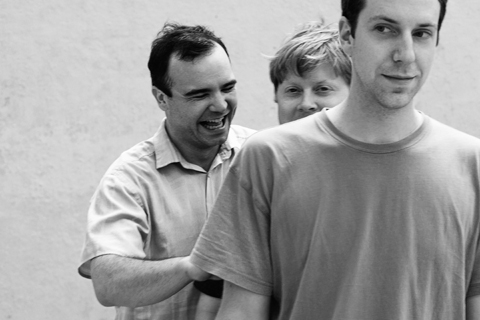
BREAKING THE MOLD Future Islands. |
Romance is terrifying. It is second-guesses and regrets, passion manifested in polar extremes, and an ongoing search for certainty. We all know this, and if it's well documented in the first two-thirds of most romantic comedies (before fantasy pulls the rug out from under anxiety), no one (except maybe Billy Joel) seems to sing about it very much.
Enter Samuel T. Herring and his beguiling Baltimore (by way of North Carolina) trio, Future Islands, who I'd wager will play one of the best local shows of the year Sunday night at SPACE Gallery. They are a sort of new wave band in Purgatory, and Herring acts as night watchman. His voice reminiscent of any number of outcasts — Tom Waits, Meatloaf, Casey Mercer of Frog Eyes, Gollum — Herring sings in alternately raspy and guttural (yet always intensely soulful) tones of loss and memories both pained and perhaps manufactured.
On the funereal title track of the band's most recent album, last year's On the Water (Thrill Jockey), Herring keeps his hurt in the present tense: "Never stopped your letters burning/I shield you like a candle." Later, pathetically, he asks, "Can I be the one you'll hold tonight?" His gorgeous duet with Wye Oak's Jenn Wasner, "The Great Fire," proposes a revised courtship, repeating "If you let me be there again."
This is, to be sure, some earnest melodrama, and Herring isn't reluctant to ham it up. (This is especially true on stage, where the band has a tremendous reputation.) But, as a unit, Future Islands are remarkably disciplined. Like Spoon, they're the type of band that primarily operate at 90-percent capacity, always withholding the one sliver of passion that makes an anthem pop.
As such, their two most recent albums — On the Water and 2010's In Evening Air (also Thrill Jockey) — are archetypal "growers." One listens to In Evening Air's ruminative "An Apology," with its auspicious 2/4 drum-machine beat, waiting for a chorus that never arrives. Its lone moment of catharsis is a fleeting three words where Herring's voice becomes briefly, truly unhinged — "so far away" — before it trails off, muttering the line again. Even that album's most transcendent pop moment, "Swept Inside," with William Cashion's bass thrum worthy of New Order/Joy Division's Peter Cook, holds back: Herring snarl recedes in favor of a few brief, tranquil minutes of hope.
Nonetheless, In Evening Air is one of the most rewarding indie-rock albums of recent years, both gratifyingly weird and conventionally satisfying in equal measures. On the Water is, on its face, a darker beast: the emotions bleaker, the atmosphere more stifling. But what atmosphere. On "Beyond the Bridge," the synths hit like solar flares and Cashion and the trio's drum machine dance a moody, intricate samba. Interludes such as "Open" and "Tybee Island" are all pacific sea foam, a nice reminder of the war of metaphors between fire and water prevalent in Herring's lyrics. And album centerpiece "Close to None," which begins as one of these ambient passages, finally delivers in full the ecstasy Future Islands so shrewdly mete out elsewhere. The beat is delicious, plastic cheese, airy and insistent enough for a John Hughes soundtrack, and Herring bleats all around it, singing his own backup vocals to a girl who "looked like you wanted home/And now that I've found you/You're not alone."